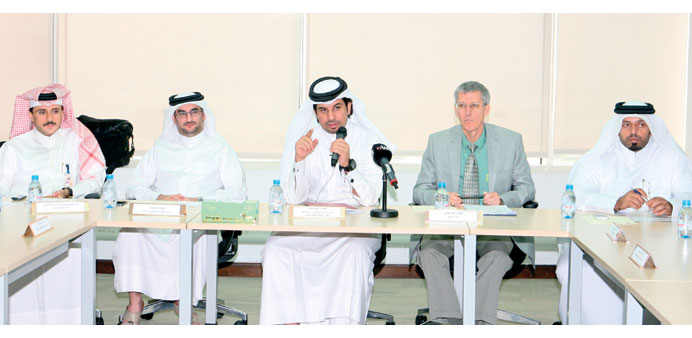By Ramesh Mathew/Staff Reporter
Large-scale infrastructure development works would be launched shortly in the fast-growing residential neighbourhoods of Rawdat Legeim and Bani Hajer.
The two neighbourhoods are under the Rayyan municipality.
The first phase of the work, costing approximately QR326mn, involves laying of new roads, sewerage networks, erecting traffic signals, and street landscaping among other activities, said Saoud al-Tamimi, senior engineer and manager of the roads projects division of the local roads and drainage department of Ashghal (Public Works Authority), at a meeting that was attended yesterday by contractors, officials of the Rayyan municipality, and programme management consultants of Asghal.
Al-Tamimi explained that the two western Doha suburbs, which is spread over 152 hectares, have witnessed large-scale movement of people in the last few months, with many up-market residential and commercial complexes completed in the neighbourhood.
The official said that the first phase of the work, including some 23km of arterial and local roads of widths varying between 16m and 40m, would be completed in a period between 15 and 18 months as per the current plans.
The road networks to be undertaken under the plan would have two signal junctions with priority intersections that would ensure road safety and effective traffic movement in the area.
All this would considerably improve the quality of life of the residents in the neighbourhoods. The new roads will not only link the entire area but will eventually allow residents easy access to Doha.
Al-Tamimi said that upon the completion of the infrastructure works, the area would have world-class services and amenities, including dedicated walking and cycling tracks along its roads.
Taking into account the safety of the residents and others moving in the area, a number of pedestrian crossings, safety fences and clear signage would also be put in place in the neighbourhood.
Al-Tamimi said that the completion of the project would also ensure continuous access to essential services such as water and power.
He added that agencies like Kahramaa and Ooredoo would also be announcing developmental projects in the neighbourhood in the coming days.
Ashghal would ensure that access to the area is maintained throughout the infrastructure project period.
“The construction activities in the vicinity of the educational institutions would only be carried out during the school holidays and after the daily operating hours,” al-Tamimi said.
The entrances and exits to the schools would remain open during the operating hours and safe routes around the construction areas would be made, the official added.
Al-Tamimi also explained the significance of the five- to seven-year plans of Ashghal’s local roads and drainage programme, which he said is designed to upgrade and maintain road and drainage networks across the five regions in the country, namely Qatar North, Qatar South, Doha North, Doha South, and Doha West.
Khatib & Alami WSP, AECOM, Hyder Consulting, Parsons, and Atkins are the five consultants working with Ashghal to implement the projects under the local roads and drainage programme.
It was also explained that more than 90 works are currently handled in Doha West alone.
Besides al-Tamimi, senior engineers from Rayyan municipality Hani al-Obaidli, Ghanim al-Suwaidi, and Hamad al-Qahtani also spoke at the meeting.
The next phase of infrastructure works in Bani Hajer and Rawdat Legdeim, which will be much larger in terms of activities, would be undertaken between July and September and completed in about 18 months, according to Ashghal officials.

Al-Tamimi (centre) with other officials at the meeting yesterday.
